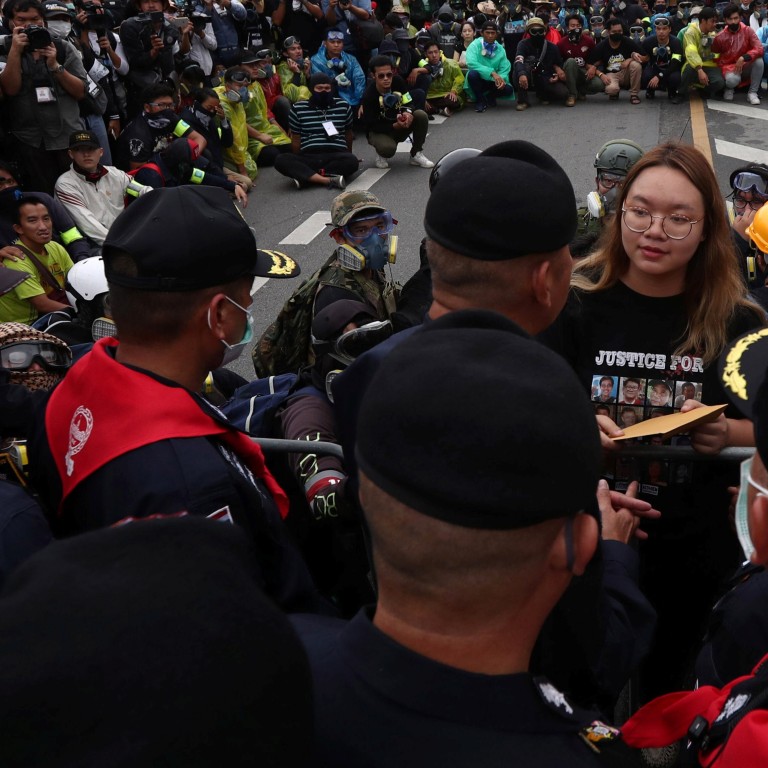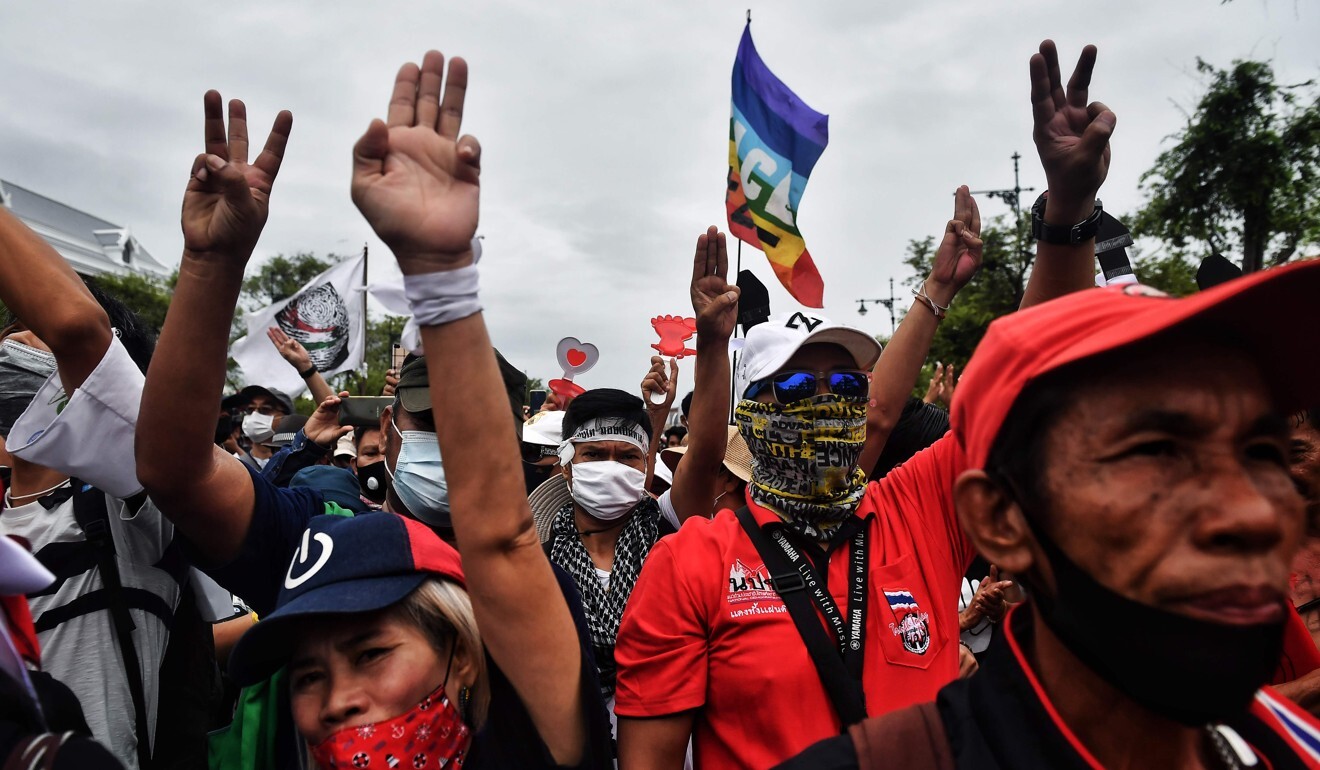
Thai student protesters gain upper hand as Prayuth government reels from Covid-19 and tourism crash
- Six weeks since Thailand’s pro-democracy movement demanded reforms, the government has yet to respond, seeking to wait out the protesters
- The government is said to be holding off on a crackdown – its usual course of action – even as the king assembles a coterie of military loyalists
The moment protesters strayed into the forbidden territory of the monarchy, many Thais thought the countdown to a crackdown had begun.
The dates of bloody crackdowns – 1973, 1976, 1992, 2010 – mark the tragic course of Thailand’s faltering democracy struggle, serving as reminders to the 2020 protesters of the risks of taking on the Thai establishment.
But Southeast Asia’s second-biggest economy can ill-afford a violent political crisis as it contends with a record economic contraction due to the Covid-19 crisis – estimated at 8 to 10 per cent by the end of the year – and the stigma of street violence as the government tries to usher back vital tourism revenue and much-needed foreign investment.
“The government has been restrained because they want to hold onto power as long as they can,” said Thammasat University student Panusaya “Rung” Sithijirawattanakul, “Apart from buying time, they’ve got no game.”
It was Rung’s calls during protests at the university on August 10 that transformed an angry pro-democracy movement into an existential threat to the status quo.
Thai protests: thousands brave rain to call for political, royal reforms
It is a game-changing plea directed at an immensely rich and powerful institution, which is shielded from scrutiny by a harsh royal defamation law and a royalist army.
The military-aligned government, in power since a 2014 coup and then elected by a constitution it wrote, has been tepid in its response, marshalling the peaceful protests with unarmed police.
“A brutal crackdown would only tarnish further the image of the state,” said Paul Chambers, an academic at the Centre of Asean Community Studies Naresuan University, in northern Thailand. “That is an option, of course … but it is further down the list.”
Instead, the government is seeking “to wait out the student protesters – to not violently attack them but rather acknowledge their right to assemble, disagree with them, promise token changes and move forward”, he said.

WHICH WAY TO TURN?
“We use reason to garner support in this fight. I don’t believe the state is brave enough to use force on us,” said Tatthep “Ford” Ruangprapaikitseri, 23, the leader of the Free People protest groups. “More important, they have no legitimacy to do so.”
Thanathorn Juangroongruangkit, the charismatic leader of the now banned Future Forward party and darling of Thai millennials, had been a conduit inside parliament for anti-government anger until he was banned from politics in early 2020 – and then angst began to move to the street.
Unpopular but holding on, Prayuth has reached for compromise by putting a motion before parliament that could start the process of amendments or a rewrite of the constitution. Late Thursday, several thousand protesters had gathered outside parliament, where lawmakers were due to vote on motions that could lead to the changes. The motion, however, was delayed for 30 days after thousands of people mobbed parliament, demanding a complete rewrite.
The motion, as it is written, does not appear to touch key issues concerning the monarchy and would not set a timetable for change until deep into 2021.
“It’s a gesture of goodwill, an attempt to unlock the political deadlock,” Khemthong Tonsakulrungruang, a law professor at Chulalongkorn University, said of lawmakers’ deliberations. But even if the motion eventually passes, “it’ll fall into a rabbit hole of Thailand’s bureaucratic system”, he said.
Prayuth has called the protesters “our children” who need protection, yet government agencies have thrown charges from sedition, computer crimes and blocking traffic at key protest figures.
“In this way, the state is trying to gradually exhaust the protesters,” Chambers said of the tactic.
BACKSTAGE … FOR NOW
Thailand’s notorious political fault-lines are now reopening.

02:40
Weekend of anti-government protests in Thai capital Bangkok continue to challenge monarchy
Dormant since the coup, the red-shirt movement made their largest show of force last weekend at the Sanam Luang royal field, near the royal palace in Bangkok, raising the prospect of a large alliance with the students.
Meanwhile, the arch-royalists pull small crowds on Bangkok’s streets and elsewhere to condemn the student protesters. But others join Facebook groups to support the monarchy rather than doing so on the streets – tacit support from an older, conservative generation alarmed at the brassy youth movement and its castigation of the monarchy.
“I’m against the constitutional amendment proposed by a bunch of ‘nation-hater’ kids,” Srisuwan Janya, Secretary-General of the Association to Protect the Thai Constitution (APTC), said in a Facebook post this week, which drew several thousand likes.
“He who insults the institution must suffer misfortune,” he said signing off with the hashtag in Thai of “LetThemEndUpinPrison”.
LOYALTIES AND INTRIGUE
King Vajiralongkorn, who spends most of his time overseas and is a remote figure to many Thais, has looped key Bangkok military units under his direct command, part of a careful assemblage of loyalists at the heart of the palace.
His personal retinue now contains the soon-to-be-retired army chief, Apirat Kongsompong.
Experts say the “network monarchy” – the clutch of billionaire tycoons, army chiefs, lifelong courtiers and advisers – are well entrenched after decades of power-building, and favour the stability of a political consensus they crafted.
But cracks may be appearing in a country where back room intrigue is never far away, although the outgoing army chief has denied rumours of a looming coup against Prayuth if the protests get out of hand.
Thai protests: coup fears as general retires, military hedges US-China bets
Meanwhile, some speculate that fissures could appear in unexpected places.
Young, brazen, fed up at a grim economic future, the student protest movement says it has momentum on its side.
“All we really want is to solve a problem once and for all,” said Rung, the student protest leader from Thammasat University.
“I know that they are using scare tactics to silence the people,” she said, referring to the government.
“It just won’t work with me.”

